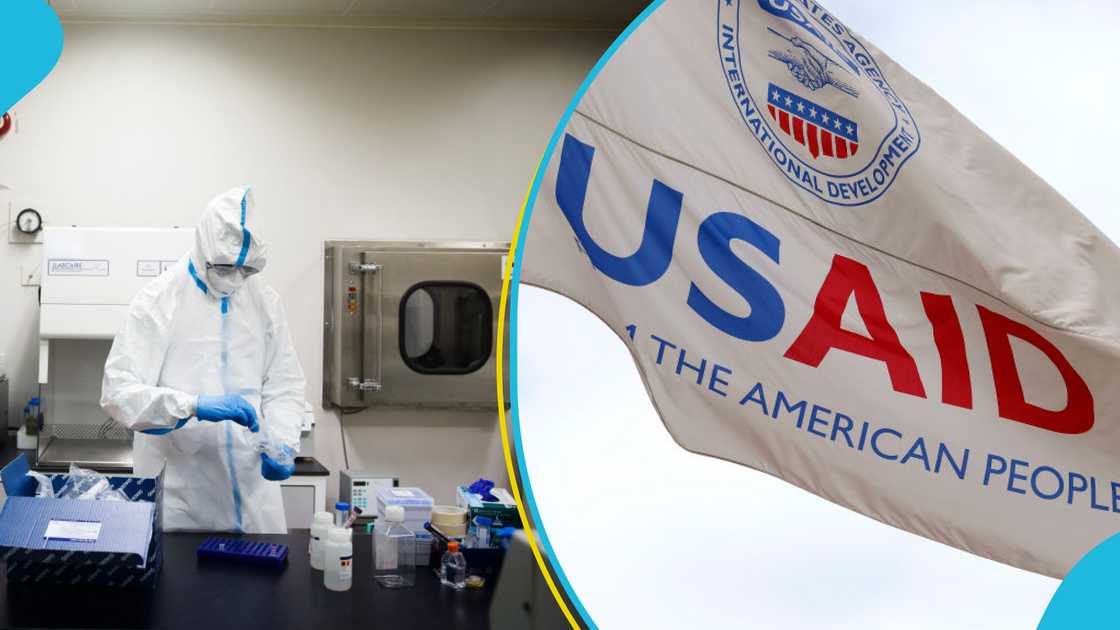USAID Funding Freeze Is Set To Leave Ghana’s Researchers And Scientist In The Cold
Scientists are set to take a big hit from the departure of USAID and this will have ripple effects on other parts of Ghanaian society.
FHI 360 Ghana, which has operated in Ghana since 1981, has been critical to people working to safeguard human and animal health.
However, these efforts were dealt a critical blow with the suspension of USAID funding on the orders of new US President Donald Trump.

Source: Getty Images
“They [FHI 360 Ghana] sent a letter to our office, that everything is on hold because of the suspension of funding activities,” noted Dr Theophilus Odoom, a Veterinary Surgeon at the Veterinary Service Directorate.
USAID similarly supports the Food and Agriculture Organisation to train and build capacity in Ghana to reduce foodborne disease risks, strengthen consumer protection, and increase market confidence in the country’s meat products.
The aid also allows for technical support and logistics support which is critical for diagnosing zoonotic diseases. Ghana has had to deal with diseases like Marburg virus, bird flu and rabies, while trying to eliminate rabies by 2030.
Beyond Odoom's field and expertise, USAID's work in Ghana has spanned increasing agricultural production, employment opportunities, and income for the poor, improving the quality of health services and education, and strengthening local government institutions.
Odoom noted that training and diagnostic capacity would be reduced and some diseases could slip past the surveillance efforts. There would also be some economic consequences because of the hit farmers will take.
“All the reagents that we use for the diagnosis of the African Swine fever has been coming from FAO and FAO gets their support from USAID… If we don’t train all these staff before we deploy them, then they will be handicapped.”
“It is going to be a blow to the farmers if their animals are dying and we cannot diagnose further what is killing the animals.”
Dr. Mavis Owureku-Asare, a food scientist and the CEO of Impact Food Hub, has in the past benefited from training and capacity building supported by USAID.
Owureku-Asare admitted she never envisioned a Ghana in which USAID support for scientists like herself would end.
"For some funny reason, because of the nature of their support over the years, I didn’t think this was something that this could happen.”
Owureku-Asare described USAID as being very consistent with funding for research and other development projects.
Funding for research from other sources has been dwindling over the years, making USAID’s support over the years dear to people in academia like Owureku-Asare.
Moving forward, stakeholders remain unsure about how the gap left in the research and science space will be filled.
Researchers in Ghana have consistently highlighted the broader challenge of uninterrupted resources to create and generate knowledge and innovations to tackle Africa-specific challenges.
Reports indicated that 15 different research projects being implemented by the Council for Scientific and Industrial Research (CSIR) are in danger of collapse because of USAID's departure.

Source: Facebook
President John Mahama directed the Finance Minister to bridge the funding gaps created by the suspension of USAID's international funding programme. These gaps are estimated at $156 million, which is not in the top 10 for Africa.
Odoom noted that meetings had been had with the agriculture ministry but conceded that it was too early to outline what interventions the government would make.
Owureku-Asare is also unsure of what the central government could do to fill the huge gap. But she stressed that a good starting point would be assessing the impact of the funding cuts.
“Nobody can fill the space. They need a plan in place or else they will have severe impact.”
Moving forward, Owureku-Asare reminded of the commitments the government has already made to research but is not meeting.
The Ghanaian government pledged US$50 million as seed money for the Ghana National Research Fund (GNRF), established under the Ghana National Research Fund Act (Act 1056) which was passed in 2020 but it is still not operational.
In 2006, member countries of the African Union committed to spending at least 1% of their GDP on research and development. Ghana has never been able to meet this commitment.
Owureku-Asare stressed that government support for research must improve if Ghana is to fill the gap left and USAID's departure presents an opportunity to turn over a new leaf.
"We are so used to donors coming to our aid that we as a country, we are not doing much... This is a bold step [to end USAID support] that should point government into a certain direction of revisiting the research fund.”
Proofread by Bruce Douglas, senior copy editor at YEN.com.gh
Source: YEN.com.gh





